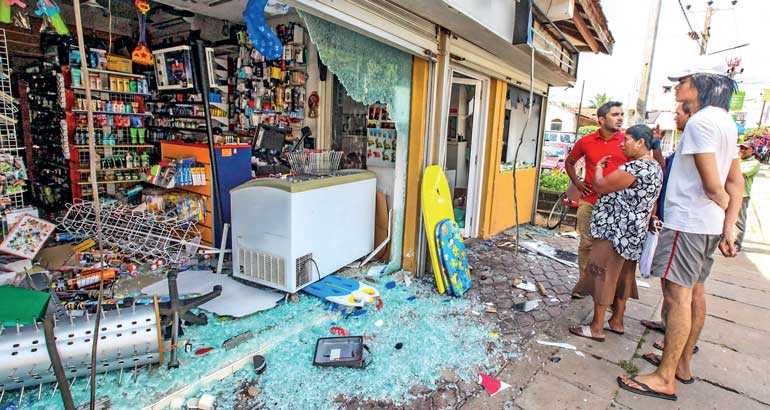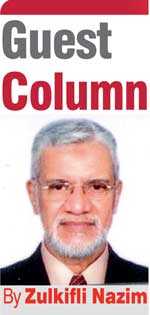Tuesday Feb 17, 2026
Tuesday Feb 17, 2026
Wednesday, 20 November 2019 01:08 - - {{hitsCtrl.values.hits}}

We have seen considerable incidents in recent history where, due to lack of forbearance, compassion, mercy and benevolence, people have attacked people of other faiths, their places of worship and their communities – Pic by Chamila Karunarathne
Epictetus, the Greek stoic philosopher, was accustomed to saying that there are two vices that are by far the most grave and vile of all; lack of endurance and lack of self-control; when either we do not endure or bear the wrongs we ought to bear, or we do not resist those things and pleasures that we ought to resist. And thus, he says, if someone should hold these two words in his mind and attend to them in ruling over himself and keeping watch over himself, he will, for the most part, live a life that is free from wrongdoing and free from disturbance.
It doesn’t matter how successful or unsuccessful we are right now. What matters is whether our habits, our thinking and our attitude are putting us on the path toward fairness and tolerance. We should be far more concerned with our current trajectory rather than dwelling in the past.
Fairness is a fundamental quality and requirement for a modern society. In addition to the mere promise of equality and justice, members of society must actually feel and experience a sense of fairness and justness in their daily lives and in all of their interactions with the apparatus of governance and social order. Justice should be meted equally and without bias. People need to feel that not only is a society just and fair for those of preferred social standing, but for all in society, even those of lower social standing, minority groups, and the disenfranchised. A fundamental necessity of a just humanitarian society is freedom from tyranny, freedom from the arbitrary, capricious whim of a dictator or ruling elite. 
Beyond basic survival, the members of a society require some significant sense of harmony to tolerate the close proximity and degree of interaction required for social behaviour. A key pillar of harmony and bulwark against the many negative tendencies that can occur in a complex society in a harsh world is goodwill and benevolence, the feeling of wanting to do good for others independent of whether they have any similar reciprocal feelings or not.
Although the term humanity also refers simply to the totality of all humans, collectively, its main reference is to a sense of benevolence towards each and every individual, everywhere, but in one’s local society in particular. Humanity is mostly about compassion and caring, concern for the well-being of everyone in society, regardless of their social standing, where they are now, or where they came from. Humanity is wanting the best for everyone, no matter who they are. Society must embody humanity, otherwise it ceases to be connected to the people and would become unsustainable. The only truly sustainable society is one that embodies humanity at all levels. Granted, that is the ideal and no society is ever so ideal, but at least it is a goal and a direction for progress.
Society is generally analysed at a national level. Despite the degree of commonality, national history and the natural history of our country binds the citizens of a country into an integrated unit that we commonly think of as a society.
Fairness is a fundamental quality and requirement for a modern society. In addition to the mere promise of equality and justice, members of society must actually feel and experience a sense of fairness and justness in their daily lives and in all of their interactions with the apparatus of governance and social order. Justice should be meted equally and without bias. People need to feel that not only is a society just and fair for those of preferred social standing, but for all in society, even those of lower social standing, minority groups, and the disenfranchised. A fundamental necessity of a just humanitarian society is freedom from tyranny, freedom from the arbitrary, capricious whim of a dictator or ruling elite
National laws, a constitution, and central, national government all reinforce the country as being the primary aggregate unit of society. That is not to take away in any sense the values of society but interests at home, in one’s country, always come first. If at any moment a majority or near-majority of individuals feel that they are disenfranchised from their own society, society begins to disintegrate and begin a slow, downward path or spiral towards total collapse and things can change.
There is no clear consensus about the future of society. Some see maintaining and restoring the status quo as a priority, others see progress and dramatic change and expansion of government as a priority, others see incremental improvement and tolerance as the priority, and many are simply struggling to keep up with the pressures of daily life rather than worrying too much about the future beyond the near future or maybe even beyond today; benefits that will only be felt when mutual goodness prevails, when mutual respect and understanding prevail.
If, instead of good feelings, hatred emerges, if restlessness usurps heartfelt peace, then we must accept that this is not progress, but is something that will take us towards unexpected disastrous results.
Sri Lanka is a small country where people of different backgrounds, cultures and religions are living together, and full of diversity, establishing tolerance and harmony has become very crucial and important, and fostering mutual love and affection has become vital. Without tolerance and harmony the lasting peace of societies cannot be maintained, and loyalty for each other cannot be established.
Loyalty is borne from feelings of love and affection. At a personal level the feelings of love strengthens the feelings of loyalty. When a citizen loves his country, he exhibits loyalty and devotion and makes sacrifices for the sake of the nation. If sentiments of love do not exist, then the spirit of sacrifice cannot be formed. Unless a person loves another he can never have good feelings in his heart towards him, and he cannot faithfully fulfil the rights due to that person. Lack of this understanding leads to unrest, chaos, violence, and finally it destroys the peace and security of society.
When people fail in their arguments they become intolerant, and then they use force and aggression to support their point of view. We have seen considerable incidents in recent history where, due to lack of forbearance, compassion, mercy and benevolence, people have attacked people of other faiths, their places of worship and their communities.
Violence and conflict continue to thwart efforts to meet humanitarian goals and tackle major challenges. How nice it would be if everyone tries to express himself in a decent and respectful way with understanding, patience and kindness.
A positive attitude provides a new way of conceptualising development as the emphasis is placed on what creates a thriving society, and as such is applicable to developed societies as well as developing societies. Through placing the emphasis on the positive, it reframes our conceptualisation towards what works. Positive attitude not only creates peace, but also creates the optimal conditions for thriving economies, better inclusion, more resilience and societies that are more capable of adapting to change.
Every member of the Sri Lankan society must have the willingness to accept and tolerate, opinions or behaviour you may not agree with, or to behave sensibly with those who are not like you. It means showing respect for the race, gender, opinions, religion and ideologies of other people or groups, and to admire the good qualities and good work of others. And to express one’s point of view in a decent and respectful way while respecting the sentiments of others, because it plays a vital role to establish peace and love, from the smallest unit up to the highest unit of society.
It is simply a matter of fundamental human rights. The right of every human being that his sensibilities and sentiments shall not be violated and offended and every human person has the right to have an opinion and to express it.
The world is full of diversity, and that is the beauty of our universe. If there had not been any diversity, the world would appear boring and unattractive, and without any competition.
“When politics and home life have become one and the same thing, then, it is evident that we will be in a state of total liberty or anarchy.” — Leo Tolstoy